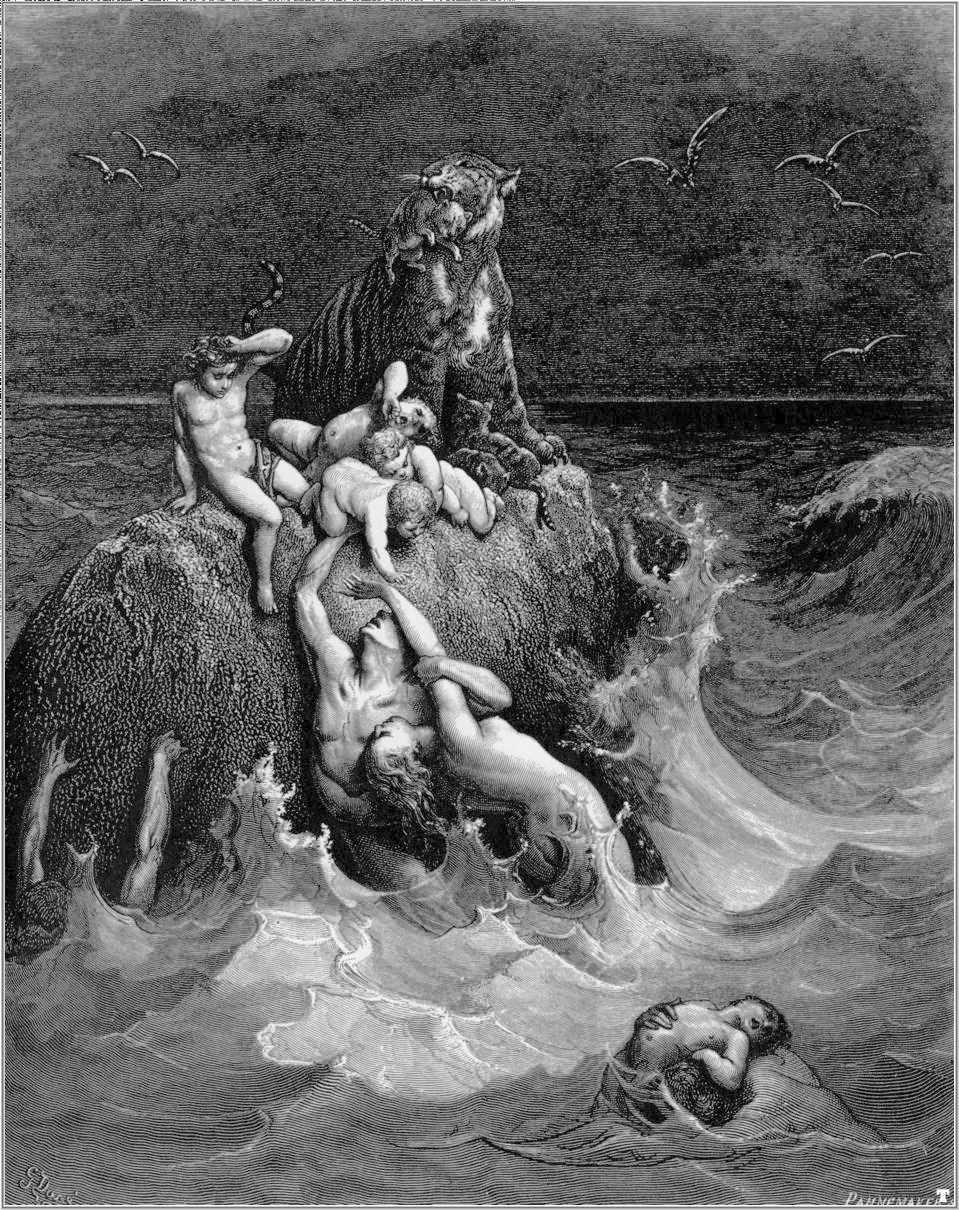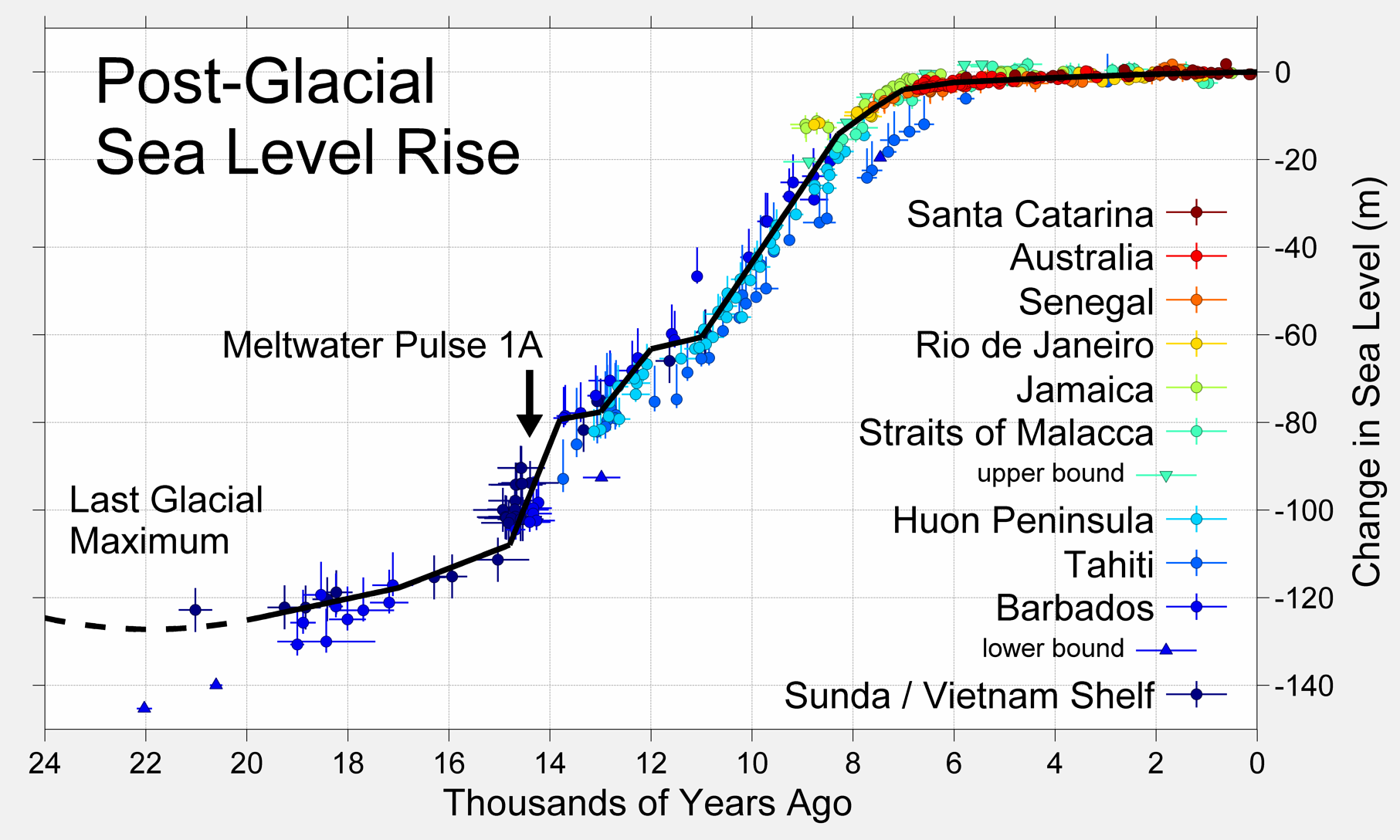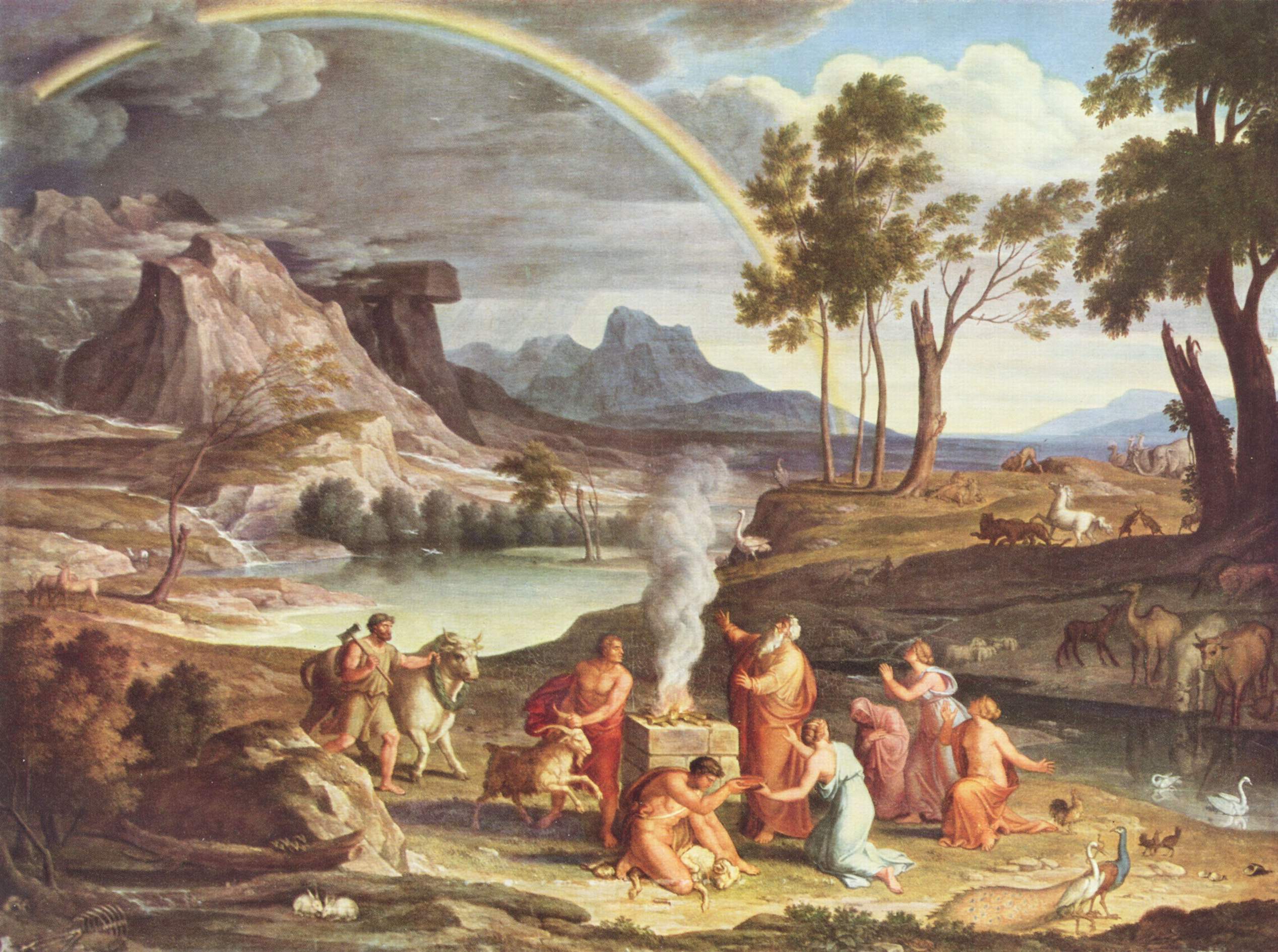|
Noah
Noah (; , also Noach) appears as the last of the Antediluvian Patriarchs (Bible), patriarchs in the traditions of Abrahamic religions. His story appears in the Hebrew Bible (Book of Genesis, chapters 5–9), the Quran and Baháʼí literature, Baha'i writings, and extra-canonical, extracanonically. The Genesis flood narrative is among the best-known stories of the Bible. In this account, God "regrets" making mankind because they filled the world with evil. Noah then labors faithfully to build the Noah's Ark, Ark at God's command, ultimately saving not only his own family, but mankind itself and all land animals, from extinction during the Great Flood, Flood. Afterwards, God makes a Covenant (biblical), covenant with Noah and promises never again to destroy the earth with a flood. Noah is also portrayed as a "tiller of the soil" who is the first to cultivate the vine. After the flood, God commands Noah and his sons to "be fruitful, and multiply, and replenish the earth." The sto ... [...More Info...] [...Related Items...] OR: [Wikipedia] [Google] [Baidu] |
Genesis Flood Narrative
The Genesis flood narrative (chapters 6–9 of the Book of Genesis) is a Hebrew flood myth. It tells of God's decision to return the universe to its pre- creation state of watery chaos and remake it through the microcosm of Noah's ark. The Book of Genesis was probably composed around the 5th century BCE; although some scholars believe that primeval history (chapters 1–11), including the flood narrative, may have been composed and added as late as the 3rd century BCE. It draws on two sources, called the Priestly source and the non-Priestly or Yahwist, and although many of its details are contradictory, the story forms a unified whole. A global flood as described in this myth is inconsistent with the physical findings of geology, archeology, paleontology, and the global distribution of species. A branch of creationism known as flood geology is a pseudoscientific attempt to argue that such a global flood actually occurred. Some Christians have preferred to interpret th ... [...More Info...] [...Related Items...] OR: [Wikipedia] [Google] [Baidu] |
Japheth
Japheth ( ''Yép̄eṯ'', in pausa ''Yā́p̄eṯ''; '; ; ') is one of the three sons of Noah in the Book of Genesis, in which he plays a role in the story of Noah's drunkenness and the curse of Ham, and subsequently in the Table of Nations as the ancestor of the peoples of the Aegean Sea, Anatolia, Caucasus, Greece, and elsewhere in Eurasia. In medieval and early modern European tradition he was considered to be the progenitor of the European peoples. Javakhishvili, Ivane (1950), ''Historical-Ethnological problems of Georgia, the Caucasus and the Near East''. Tbilisi, pp. 130–135 (in Georgian). Etymology The meaning of the name ''Japheth'' (: ''y-p-t'') is disputable. There are two possible sources to the meaning of the name: * From the Aramaic root (''p-t-h''), meaning "to extend". In this case, the name would mean "may He extend", according to the interpretation of Rashi. * From the Hebrew root (''y-p-h''), meaning "beauty", in which case the name would mean "beaut ... [...More Info...] [...Related Items...] OR: [Wikipedia] [Google] [Baidu] |
Wives Aboard Noah's Ark
The wives aboard Noah's Ark were part of the family that survived the Deluge in the biblical Genesis flood narrative from the Bible. These wives are the wife of Noah, and the wives of each of his three sons. Although the Bible only notes the existence of these women, there are extra-biblical mentions regarding them and their names. In the Bible In Genesis 6:18, God says to Noah, "But I will establish my covenant with you, and you shall come into the ark, you, your sons, your wife, and your sons' wives with you" ( ESV). The deuterocanonical Book of Tobit (written c. 225–175 BC) does not name any of the wives aboard Noah's Ark, but states that Noah's wife was one of his "own kindred" ( Tobit 4:12). 1 Peter 3:20 (written in the late 1st century AD) states that there were eight people on the Ark. In other writings Dead Sea Scrolls In the Genesis Apocryphon, part of the Dead Sea Scrolls, Noah's wife is named Emzara. Book of Jubilees In the Book of Jubilees (160–150 BC), co ... [...More Info...] [...Related Items...] OR: [Wikipedia] [Google] [Baidu] |
Ham (son Of Noah)
Ham (in ), according to the Table of Nations in the Book of Genesis, was the second son of Noah and the father of Cush, Mizraim, Phut and Canaan. Ham's descendants are interpreted by Josephus and others as having populated Africa. The Bible refers to Egypt as "the land of Ham" in Psalm 78:51; 105:23, 27; 106:22; 1 Chronicles 4:40. Etymology Since the 17th century, a number of suggestions have been made that relate the name ''Ham'' to a Hebrew word for "burnt", "black" or "hot", to the Egyptian word '' ḥm'' for "servant" or the word '' ḥm'' for "majesty" or the Egyptian word '' kmt'' for "Egypt". A 2004 review of David Goldenberg's ''The Curse of Ham: Race and Slavery in Early Judaism, Christianity and Islam'' (2003) states that Goldenberg "argues persuasively that the biblical name Ham bears no relationship at all to the notion of blackness and as of now is of unknown etymology." In the Bible indicates that Noah became the father of Shem, Ham and Japheth at t ... [...More Info...] [...Related Items...] OR: [Wikipedia] [Google] [Baidu] |
Shem
Shem (; ''Šēm''; ) is one of the sons of Noah in the Bible ( Genesis 5–11 and 1 Chronicles 1:4). The children of Shem are Elam, Ashur, Arphaxad, Lud and Aram, in addition to unnamed daughters. Abraham, the patriarch of Jews, Christians, and Muslims, is one of the descendants of Arphaxad. In medieval and early modern European tradition he was considered to be the ancestor of the peoples of Asia, Javakhishvili, Ivane (1950), ''Historical-Ethnological problems of Georgia, the Caucasus and the Near East''. Tbilisi, pp. 130–135 (in Georgian). and he gives his name to the title " Semites" formerly given to West Asian peoples. Islamic literature describes Shem as one of the believing sons of Noah. Some sources even identify Shem as a prophet in his own right and that he was the next prophet after his father. In the Bible Genesis 10 Genesis 10:21 refers to relative ages of Shem and his brother Japheth, but with sufficient ambiguity to have yielded different Engli ... [...More Info...] [...Related Items...] OR: [Wikipedia] [Google] [Baidu] |
Great Flood
A flood myth or a deluge myth is a myth in which a great flood, usually sent by a deity or deities, destroys civilization, often in an act of divine retribution. Parallels are often drawn between the flood waters of these myths and the primeval cosmic ocean which appear in certain creation myths, as the flood waters are described as a measure for the cleansing of humanity, for example in preparation for rebirth. Most flood myths also contain a culture hero, who "represents the human craving for life". The oldest known narrative of a divinely inititated flood originates from the Sumerian culture in Mesopotamia, among others expressed in the Akkadian Athra-Hasis epic, which dates to the 18th century BCE. Comparable flood narratives appear in many other cultures, including the biblical Genesis flood narrative, '' manvantara-sandhya'' in Hinduism, Deucalion and Pyrrha in Greek mythology, also the Cheyenne, Blackfeet and Puebloan traditions. Mythologies The '' Ep ... [...More Info...] [...Related Items...] OR: [Wikipedia] [Google] [Baidu] |
Book Of Genesis
The Book of Genesis (from Greek language, Greek ; ; ) is the first book of the Hebrew Bible and the Christian Old Testament. Its Hebrew name is the same as its incipit, first word, (In the beginning (phrase), 'In the beginning'). Genesis purports to be an account of the Genesis creation narrative, creation of the world, the early history of humanity, and the Jews#Origins, origins of the Jewish people. In Judaism, the theological importance of Genesis centers on the covenants linking God in Judaism, God to his chosen people and the people to the Promised Land. Genesis is part of the Torah or Pentateuch, the first five books of the Bible. Tradition credits Moses as the Torah's author. However, there is scholarly consensus that the Book of Genesis was composed several centuries later, after the Babylonian captivity, Babylonian Babylonian captivity, captivity, possibly in the fifth century BC. Based on the scientific interpretation of Archaeology, archaeological, Genetics, genetic, ... [...More Info...] [...Related Items...] OR: [Wikipedia] [Google] [Baidu] |
Judaism
Judaism () is an Abrahamic religions, Abrahamic, Monotheism, monotheistic, ethnic religion that comprises the collective spiritual, cultural, and legal traditions of the Jews, Jewish people. Religious Jews regard Judaism as their means of observing the Mosaic covenant, which they believe was established between God in Judaism, God and the Jewish people. The religion is considered one of the earliest monotheistic religions. Jewish religious doctrine encompasses a wide body of texts, practices, theological positions, and forms of organization. Among Judaism's core texts is the Torah—the first five books of the Hebrew Bible—and a collection of ancient Hebrew scriptures. The Tanakh, known in English as the Hebrew Bible, has the same books as Protestant Christianity's Old Testament, with some differences in order and content. In addition to the original written scripture, the supplemental Oral Torah is represented by later texts, such as the Midrash and the Talmud. The Hebrew ... [...More Info...] [...Related Items...] OR: [Wikipedia] [Google] [Baidu] |
Lamech (father Of Noah)
Lamech (; ''Lemeḵ'', in pausa ''Lāmeḵ''; ''Lámekh'') was a patriarch in the genealogies of Adam in the Book of Genesis. He is part of the genealogy of Jesus in Luke 3:36. Lamech (Arabic: لامك, romanized: ''Lāmik'') is also mentioned in Islam in the various collections of tales of the prophets who preceded Muhammad, which mentions him in an identical manner. Bible narrative Biblical genealogy Lamech is the eighth-generation descendant of Adam (), the son of Methuselah, and the father of Noah (), in the genealogy of Seth in Genesis 5. In Genesis 5:12-25, Lamech was a son of Methuselah, who was a grandson of Jared, who was a grandson of Kenan descended from Adam. Genesis 5:28–31 records that Lamech was 182 (according to the Masoretic Text; 188 according to the Septuagint) years old at the birth of Noah and lived for another 595 years, attaining an age at death of 777 years, five years before the Flood in the Masoretic chronology. With such numbers in ... [...More Info...] [...Related Items...] OR: [Wikipedia] [Google] [Baidu] |
Covenant (biblical)
The Hebrew Bible makes reference to a number of covenants () with God (YHWH). These include the Noahic Covenant set out in Genesis 9, which is decreed between God and all living creatures, as well as a number of more specific covenants with Abraham, the whole Israelite people, the Israelite priesthood, and the Davidic lineage of kings. In form and terminology, these covenants echo the kinds of treaty agreements existing in the surrounding ancient world. The Book of Jeremiah, verses says that YHWH will establish a new covenant with the house of Israel and the house of Judah. Most Christians believe this New Covenant is the "replacement" or "final fulfilment" of the Old Covenant described in the Old Testament and as applying to the People of God, while some believe both covenants are still applicable in a dual covenant theology. Ancient Near Eastern The Hebrew term בְּרִית ''bĕriyth'' for "covenant" is from a root with the sense of "cutting", because pacts or cove ... [...More Info...] [...Related Items...] OR: [Wikipedia] [Google] [Baidu] |
Karak Nuh
Karak (also Kerak, Karak Nuh or Karak Noah) () is a village in the municipality of Zahlé in the Zahle District of the Beqaa Governorate in eastern Lebanon. It is located on the Baalbek road close to Zahle. Karak contains a sarcophagus claimed by the locals to be the tomb of Noah.Winter, 2010, p43ff The inhabitants of Karak are Melkites, Maronites and Shia Muslims. History The town was an important religious site during the Middle Ages, drawing devotion from the local rural village communities. The town was known as al-Karak during the time of the Ayyubid dynasty and changed to Karak Nuh under the Mamluks. In medieval period, the Shia muhaddith Ahmad bin Tariq bin Sinan (b. 1132) was born in the town. In the mid-13th century, the settlement to the north of Karak Nuh, Bḥaouchiyya, was inhabited by Tanukhid emirs from Mount Lebanon who practiced the Shia faith. Karak Nuh gradually became known as a center of learning for Shia Islam and the administrative centre of the souther ... [...More Info...] [...Related Items...] OR: [Wikipedia] [Google] [Baidu] |
Abrahamic Religions
The term Abrahamic religions is used to group together monotheistic religions revering the Biblical figure Abraham, namely Judaism, Christianity, and Islam. The religions share doctrinal, historical, and geographic overlap that contrasts them with Indian religions, Iranian religions, and East Asian religions. The term has been introduced in the 20th century and superseded the term Judeo-Christianity, Judeo-Christian tradition for the inclusion of Islam. However, the categorization has been criticized by some for oversimplification of different cultural and doctrinal nuances. For example, Islam shares cultural and doctrinal exchange from Asian religions, which Abrahamic religions are usually contrasted with. Usage The term ''Abrahamic religions'' (and its variations) is a collective religious descriptor for elements shared by Judaism, Christianity, and Islam. It features prominently in interfaith dialogue and political discourse but also has entered Academic discourse socializati ... [...More Info...] [...Related Items...] OR: [Wikipedia] [Google] [Baidu] |







